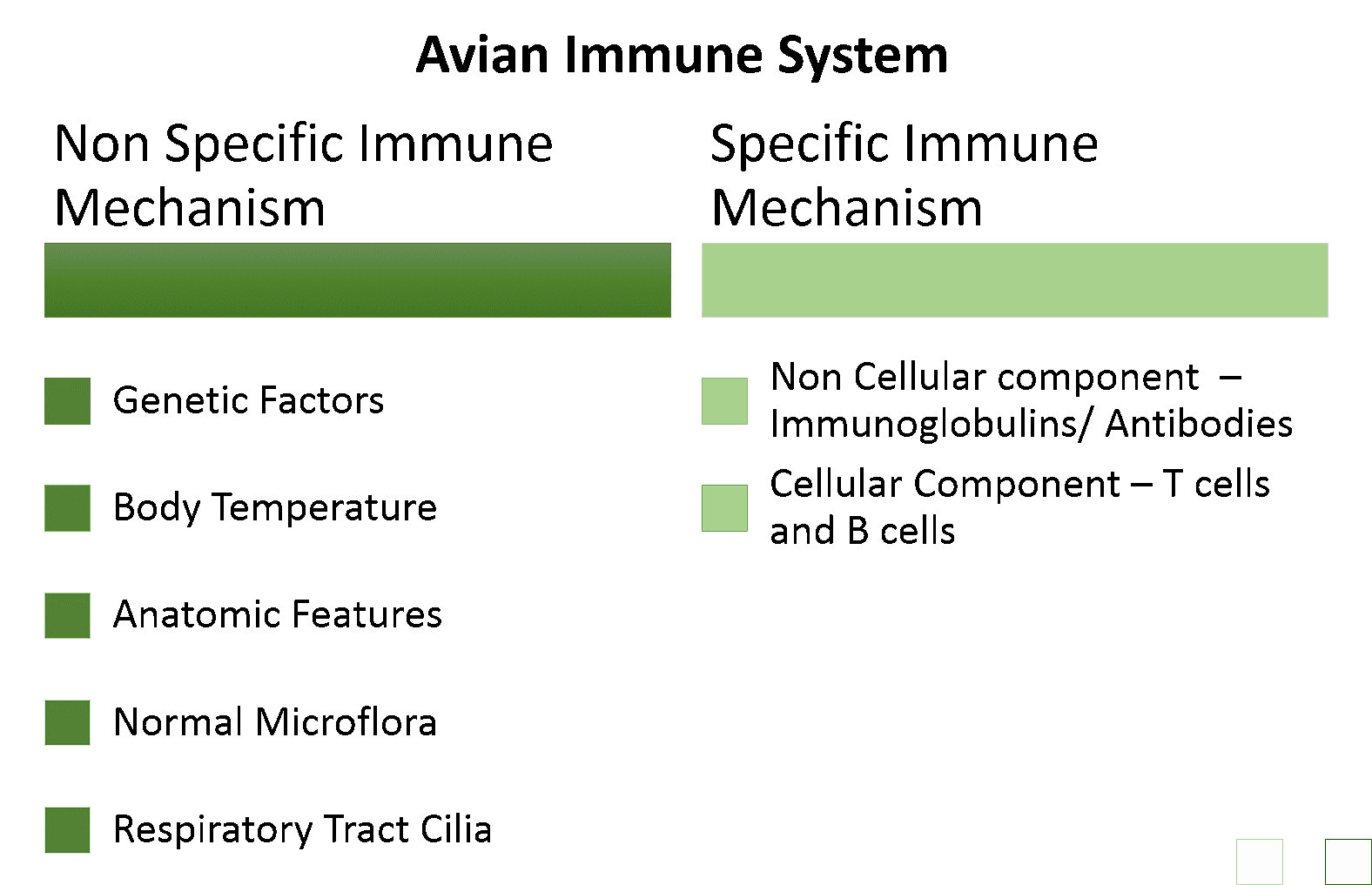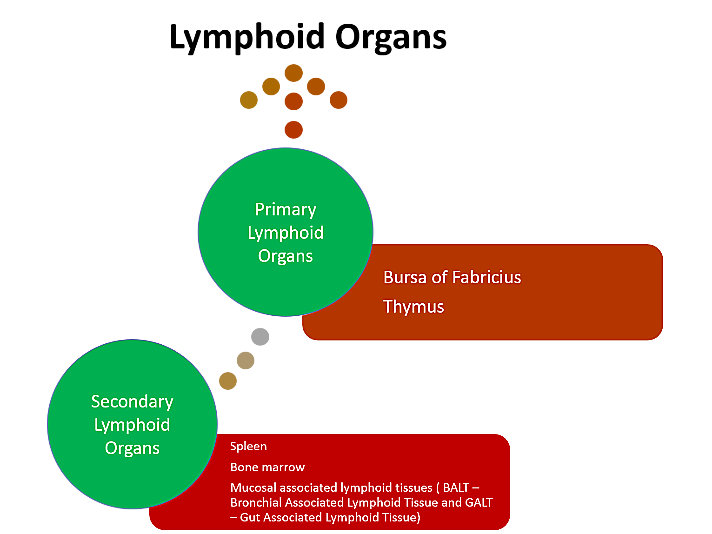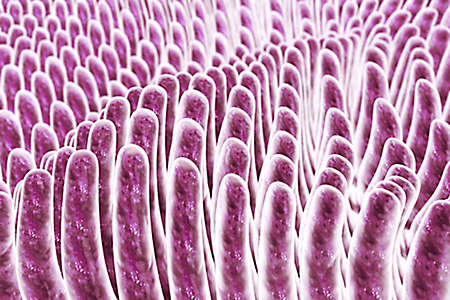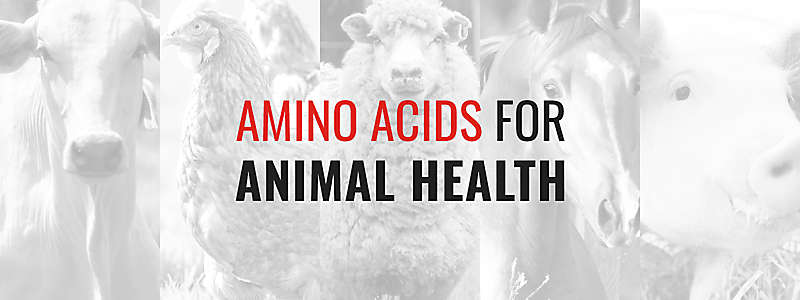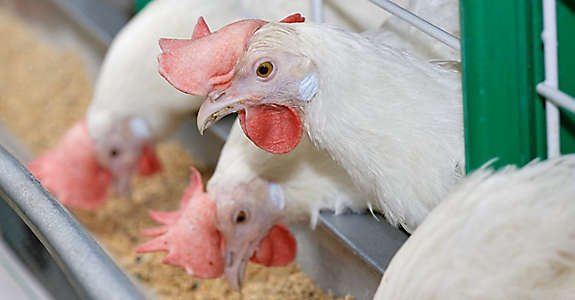Immunity Types
There are two types of immunity – active immunity and passive immunity. Active immunity is defined as the process in which a chicken produces its own antibodies following exposure to a foreign body such as bacteria. This process occurs when the chicken is given a vaccine or when there is field disease challenge. Active immunity is adversely affected by anything that damages the cellular or humoral immune systems.
Passive immunity (maternal immunity) is the process wherein the chick receives pre-made antibodies from a hen through the egg. Maternal antibodies are present in the yolk, albumen, and fluids of the egg.
Poultry Gut Immunity
The gastrointestinal tract is an important organ for maintaining health. It has two important functions -– to absorb nutrient and to act as the barrier against unwanted compounds and germs. Because of its extensive surface, the GI tract is also a major port of entry for many pathogens. The GI tract immune system has the major responsibility to act on known pathogens while ignoring components of food or “commensal” microorganisms that inhabit the gut. Failure to do this might end in intestinal inflammation and tissue degeneration.
Inflammation
The immune system in the intestines plays a major role in maintaining gut health. The inflammation due to compromised gut health if not tightly controlled can cause great damage to the intestine itself. It poses risks to high producing poultry such as broilers that include growth retardation, increased risk of infections, etc. Clostridia, like infections, benefit from this type of inflammation. One possible option to reduce the inflammation is to reduce the energy content, and thereby decrease the inflammatory stimulus. A few AGPs were found to have anti-inflammatory action. As there is a great awareness today to reduce AGPs and/or completely withdraw AGPs altogether, producers are actively searching for suitable alternatives.10
Immune modulators
An immunomodulator may be defined as any biological or synthetic substance that can stimulate/suppress either innate, adaptive, or both arms of the immune system. A potent immunomodulator has many advantages over antimicrobials. Because immunomodulators do not affect microbes directly, they may avoid the problem of rapid emergence of resistance.6
Commonly used immune modulators in poultry
Direct-Fed Microbials (DFMs ) / Probiotics
DFMs have been used as prophylactic agents against enteric pathogens, presumably by balancing microbiota, by modulating host immunity, or both. The dietary B. subtilis , when used in a Broiler as a potential growth promoter, can provide beneficial effects on Broiler performance and modulate host humoral and cellular immune responses to enteric pathogens.7
DFMs stimulate the immune system that is exhibited in higher production of immunoglobulins, stimulation of macrophages and lymphocytes activity and also by augmentation of the production of γ-interferon.1 Regular and judicious use of probiotics has a striking effect on the immune system viz. stimulation of both humoral and cell mediated immunity through enhanced production of natural interferons/cytokines; increased macrophage, lymphocyte and natural killer (NK) cell activity; up regulated oxidative burst in heterophils; and increased immunoglobulin (IgG, IgM and IgA). Probiotics produce a gut-stabilising effect and good immune regulation, particularly through balanced control of pro-inflammatory and anti-inflammatory cytokines. Feeding probiotics could improve antibody titres against viral diseases like Newcastle disease (ND) and Infectious bursal disease (IBD). The use of probiotics increases the amount of IgA found in the intestinal lumen, the numbers of IgA, IgM and IgG producing cells, as well as the number of T cells in the cecal tonsils.5
Kemin’s proprietary organism Bacillus subtilis PB6 (CLOSTATTM ) is found to have immunomodulatory activities. The prophylactic use of this organism has helped alleviate the intestinal inflammation in the mice model.2
Butyrate
Butyrate has been appreciated for its beneficial effects on the host, including trophic and anti-inflammatory effects on epithelial cells.11 A scientific study indicated that dietary butyrate supplementation can improve the growth performance in chickens under stress, and that this could be used to moderate the immune response and reduce tissue damage. It also found butyrate supplementation in the diet of broilers to be beneficial, especially in the presence of immune stress. Improvement of growth performance in poultry may be achieved, in part, through modulation of the response to immune challenge with butyrate administration.12 Kemin has a microencapsulated product, ButiPEARLTM, that is a source of butyric acid with sustained release of active throughout intestine.
Essential Oils
Essential oils exert their mode of action mainly with their bactericidal effects of essential oils. Production and secretion of endogenous digestive enzymes, modulation of the immune system, and antifungal and antiviral activity have been proposed to address their effects on animal performance.3 Carvacrol, a commonly used essential oil in animals, has anti-inflammatory properties. The anti-inflammatory property of carvacrol is dependent on its ability to reduce the production of inflammatory mediators, such as IL-1b and prostanoids, possibly through the induction of IL-10 release.8 Kemin’s OrsentialTM is a combination of highly concentrated Carvacrol and Thymol.
Prebiotics
Prebiotics are non-digestible feed ingredients that are metabolized by specific members of intestinal microbiota and provide health benefits for the host. Prebiotics are capable of modulating gut microbiota and the immune interactions in favour of chicken health. 9

